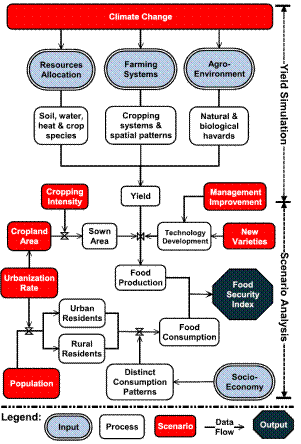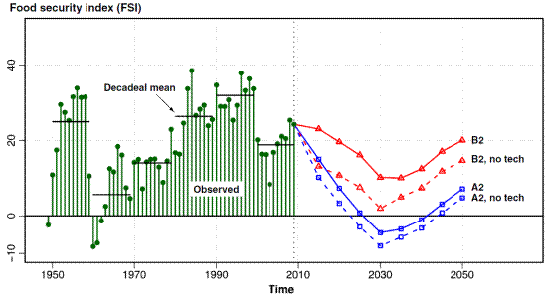分享到
Climate change impact on China food security in 2050
Climate change is now affecting global agriculture and food production worldwide. Nonetheless the direct link between climate change and food security at the national scale is poorly understood. Recently, the research group, led by Dr. TANG Huajun, the Vice President of Chinese Academy of Agricultural Science (CAAS), simulated the effect of climate change on food security in China, with the support from the National Basic Research Program of China.
The research simulated the climate change impact by using the CERES crop models and the IPCC SRES A2 and B2 scenarios including CO2 fertilization effect. Models took into account population size, urbanization rate, cropland area, cropping intensity and technology development. The results predict that food crop yield will increase +3–11 % under A2 scenario and +4 % under B2 scenario during 2030–2050, despite disparities among individual crops. As a consequence, China will be able to achieve a production of 572 and 615 MT in 2030, then 635 and 646 MT in 2050 under A2 and B2 scenarios, respectively. In 2030 the food security index (FSI) will drop from +24 % in 2009 to −4.5 % and +10.2 % under A2 and B2 scenarios, respectively. In 2050, however, the FSI is predicted to increase to +7.1 % and +20.0 % under A2 and B2 scenarios, respectively, but this increase will be achieved only with the projected decrease of Chinese population.
The research concluded that 1) the proposed food security index is a simple yet powerful tool for food security analysis; (2) yield growth rate is a much better indicator of food security than yield per se; and (3) climate change only has a moderate positive effect on food security as compared to other factors such as cropland area, population growth, socio-economic pathway and technology development. Relevant policy options and research topics are suggested accordingly. The more detailed information can be downloaded from the international Journal- Agronomy for Sustainable Development with open access at Springerlink.com.
 Fig. 1 The flow chart of the research framework. Food security assessment is conducted from a supply-demand point of view involving a series of scenarios
Fig. 1 The flow chart of the research framework. Food security assessment is conducted from a supply-demand point of view involving a series of scenarios
 Fig. 2 Relative food surplus (%) in per capita terms, or the food security index (FSI), as evaluated using census data during 1949-2009 and as projected in 2030 and 2050. Horizontal bars represent the average FSI levels at the decadal time scale
Fig. 2 Relative food surplus (%) in per capita terms, or the food security index (FSI), as evaluated using census data during 1949-2009 and as projected in 2030 and 2050. Horizontal bars represent the average FSI levels at the decadal time scale
The research simulated the climate change impact by using the CERES crop models and the IPCC SRES A2 and B2 scenarios including CO2 fertilization effect. Models took into account population size, urbanization rate, cropland area, cropping intensity and technology development. The results predict that food crop yield will increase +3–11 % under A2 scenario and +4 % under B2 scenario during 2030–2050, despite disparities among individual crops. As a consequence, China will be able to achieve a production of 572 and 615 MT in 2030, then 635 and 646 MT in 2050 under A2 and B2 scenarios, respectively. In 2030 the food security index (FSI) will drop from +24 % in 2009 to −4.5 % and +10.2 % under A2 and B2 scenarios, respectively. In 2050, however, the FSI is predicted to increase to +7.1 % and +20.0 % under A2 and B2 scenarios, respectively, but this increase will be achieved only with the projected decrease of Chinese population.
The research concluded that 1) the proposed food security index is a simple yet powerful tool for food security analysis; (2) yield growth rate is a much better indicator of food security than yield per se; and (3) climate change only has a moderate positive effect on food security as compared to other factors such as cropland area, population growth, socio-economic pathway and technology development. Relevant policy options and research topics are suggested accordingly. The more detailed information can be downloaded from the international Journal- Agronomy for Sustainable Development with open access at Springerlink.com.


Latest News
-
 Apr 18, 2024Opening Ceremony of the Training Workshop on Wheat Head Scab Resistance Breeding and Pest Control in Africa Held in CAAS
Apr 18, 2024Opening Ceremony of the Training Workshop on Wheat Head Scab Resistance Breeding and Pest Control in Africa Held in CAAS -
 Apr 03, 2024IPPCAAS Co-organized the Training Workshop on Management and Application of Biopesticides in Nepal
Apr 03, 2024IPPCAAS Co-organized the Training Workshop on Management and Application of Biopesticides in Nepal -
 Mar 28, 2024Delegation from the School of Agriculture and Food Science of University College Dublin, Ireland Visit to IAS, CAAS
Mar 28, 2024Delegation from the School of Agriculture and Food Science of University College Dublin, Ireland Visit to IAS, CAAS -
 Mar 25, 2024Director of World Food Prize Foundation visited GSCAAS
Mar 25, 2024Director of World Food Prize Foundation visited GSCAAS -
 Mar 20, 2024Institute of Crop Sciences (ICS) and Syngenta Group Global Seeds Advance Collaborative Research in the Seed Industry
Mar 20, 2024Institute of Crop Sciences (ICS) and Syngenta Group Global Seeds Advance Collaborative Research in the Seed Industry
